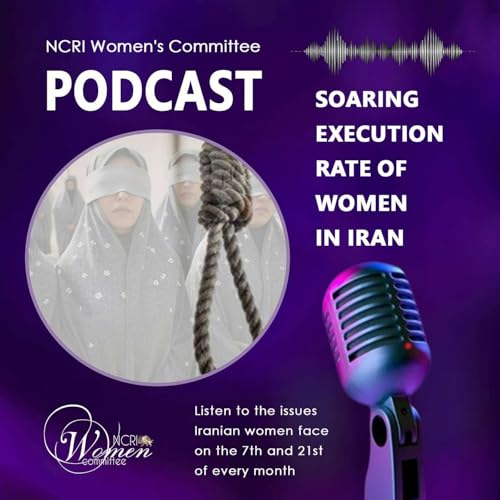
Soaring Execution Rate of Women in Iran
カートのアイテムが多すぎます
カートに追加できませんでした。
ウィッシュリストに追加できませんでした。
ほしい物リストの削除に失敗しました。
ポッドキャストのフォローに失敗しました
ポッドキャストのフォロー解除に失敗しました
-
ナレーター:
-
著者:
このコンテンツについて
Since July 30 until September 5, the Iranian regime has executed nine women. In the span of one month and one week.
This rate of execution of women, accused of ordinary crimes, has been unprecedented under the clerical regime after the massacre of political prisoners in the 1980s and specifically in 1988.
During the one year and one month since the regime’s new president, Masoud Pezeshkian, took office on July 28, 2024, more than 1700 persons have been executed in Iran, among them several political prisoners.
Before Ebrahim Raisi takes office, the clerical regime executed an average of 15 women per year. However, this rate increased to 21 under Ebrahim Raisi. And now under Masoud Pezeshkian, at least 33 women have been executed in only 8 months since the beginning of the year 2025.
The Iranian regime is the world’s top record holder of executions of women.
No government in the world has executed so many women. The list does not account for the tens of thousands of women executed in Iran on political grounds.
Many of the women executed by the mullahs’ regime are themselves victims of domestic violence against women and have acted in self-defense.
The Iranian regime open-handedly uses the death penalty as a form of punishment. In many cases, religious and ethnic minorities, political dissidents, and women are targets of the death penalty in a discriminatory manner.
Silence in the face of these executions is not simply indifference; it is a direct encouragement for the regime to continue its crimes.
The global community’s inaction not only emboldens the clerical regime—now in its most fragile state—to carry out more executions and atrocities, but also fuels its export of terrorism, regional aggression, and nuclear ambitions.
We demand from the Human Rights Council, the UN High Commissioner for Human Rights, the UN Special Rapporteurs, the European Union, governments, and relevant bodies:
Explicit and public condemnation of death sentences and incitement to killing
Taking effective and practical measures, not mere diplomatic condemnations
Immediate deployment of the independent international fact-finding mission to Iran
Conditioning any negotiations or political and economic relations with the regime on the cessation of executions and the release of political prisoners
Legal pursuit of perpetrators and commanders of these crimes, and efforts to end their impunity at the international level
Silence is complicity in crime.
The United Nations, governments, international institutions, and the world’s conscious voices bear responsibility.
The time for action is now—before it is too late.
Support the show


